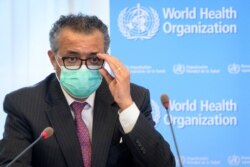The World Health Organization said Wednesday that there is a lot to learn about the omicron variant of the coronavirus, but the world is not defenseless against it and nations need to act now to keep it from spreading.
At a briefing at the agency's headquarters in Geneva, WHO Director-General Tedros Adhanom Ghebreyesus said the omicron variant has been reported in 57 countries, and that number is expected to grow.
He said certain features of omicron, including its global spread and large number of mutations, suggest it could have a major impact on the course of the pandemic. It will be important to monitor carefully what happens around the world in order to understand if omicron can become the dominant variant.
Tedros said even though answers are still needed to crucial questions, people are not defenseless against the omicron or delta variants, but countries must act now.
"We are running out of ways to say this, but we will keep saying it: all of us — every government and every individual — must use all the tools we have, right now," he said. He called on all countries to accelerate vaccine coverage in the most at-risk populations, intensify efforts to drive down transmission, and work to keep it down with a tailored mix of public health measures.
At the same briefing, WHO Chief Scientist Soumya Swaminathan cautioned against reading too much into a South African study suggesting the two-dose Pfizer-BioNTech vaccine was less effective in fighting off COVID-19 because it indicated a significant decrease in the levels of neutralizing antibodies against omicron.
Swaminathan told reporters that it is premature to conclude the reduction in neutralizing antibodies makes the vaccine less effective.
"We do not know that, because, as you know, the immune system is much more complex," she said. "There are the T-cells, there are the memory B-cells and so what we really need now is a coordinated research effort and not jumping to conclusions … study by study."
Earlier Wednesday, Pfizer announced the results of its own preliminary laboratory studies showing a third booster shot of its vaccine restored effectiveness against the omicron variant. The company and its partner, BioNTech, also announced they are developing a new version of their COVID-19 vaccine specifically to combat the new omicron variant.
Some information for this report came from Reuters.







